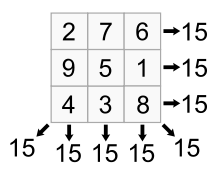Magic triangle (mathematics)
A magic triangle (also called a perimeter magic triangle[1]) is an arrangement of the integers from 1 to n on the sides of a triangle with the same number of integers on each side, called the order of the triangle, so that the sum of integers on each side is a constant, the magic sum of the triangle.[1][2][3][4] Unlike magic squares, there are different magic sums for magic triangles of the same order.[1] Any magic triangle has a complementary triangle obtained by replacing each integer x in the triangle with 1 + n − x. This means that only half of the triangles for any order need to be checked for the magic property.[1]
Examples

Order-3 magic triangles.
Order-3 magic triangles are the simplest (except for trivial magic triangles of order 1).[1]
gollark: I'm definitely not trying to offload some computing tasks to you.
gollark: Very related, too, yes.
gollark: As in, multiple clients, it is fortunately not a distributed system™.
gollark: It can't really run in the browser because it needs usable (non-IndexedDB etc.) storage, less constrained external networking, GPU access, and multidevice support.
gollark: Do NOT.
See also
References
- "Perimeter Magic Triangles". www.magic-squares.net. Retrieved 2016-12-27.
- "Perimeter Maghic Polygons". www.trottermath.net. Retrieved 2016-12-27.
- "Magic Triangle : nrich.maths.org". nrich.maths.org. Retrieved 2016-12-27.
- "P4W8: Magic Triangles and Other Figures" (PDF). Retrieved December 27, 2016.
This article is issued from Wikipedia. The text is licensed under Creative Commons - Attribution - Sharealike. Additional terms may apply for the media files.
